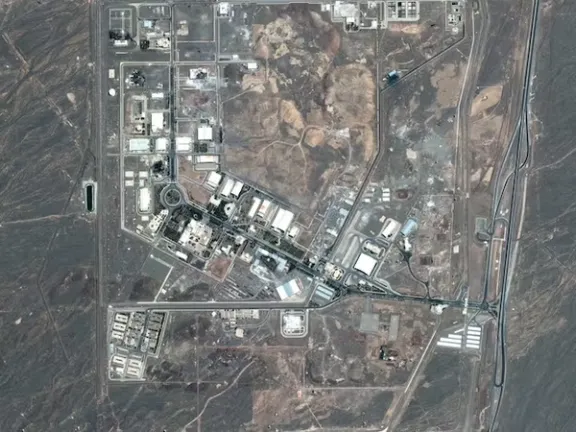IRGC Awards Naval Forces Amid Escalating Tensions
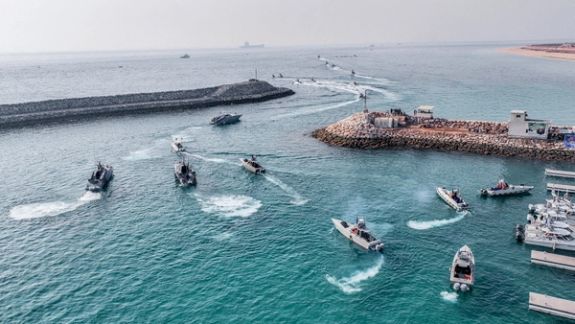
The IRGC have named their Navy as “the foremost and highest-ranking” unit in the organization, following the supposed ‘interception’ of a US warship.

The IRGC have named their Navy as “the foremost and highest-ranking” unit in the organization, following the supposed ‘interception’ of a US warship.
Reports also reveal that Hossein Salami, the Commander in Chief of the IRGC has recognized Rear Admiral Alireza Tangsiri, the Commander of the Naval Force, as the most successful commander in the organization.
This internal praise follows an incident at sea on August 17, of which the IRGC released a video showing Iran’s navy following a US warship in waters off the coast of the Strait of Hormuz in the Persian Gulf. Touted as a demonstration of the regime’s military control, the video was broadcast to prominent IRGC commanders and officials in Tehran on Saturday.
In the footage, IRGC Navy speed boats issued a clear warning to the USS Thomas Hudner warship, accompanied by two helicopters, advising them against breaching Iran's territorial waters.
A helicopter is seen landing on the deck but it is not clear if it took the actions because of an Iranian warning. Nevertheless, Rear Admiral Tangsiri highlighted the "achievement," citing the IRGC Navy's successful enforcement of compliance to their orders.
Recent maritime incidents involving Iran's seizure and harassment of vessels have triggered heightened uncertainties in the region.
Iran's introduction of advanced maritime weaponry prompted Washington to extend armed protection to commercial ships traversing the Strait of Hormuz. A substantial portion of the world's crude oil is transported through these waters and thus, it has significant strategic importance.
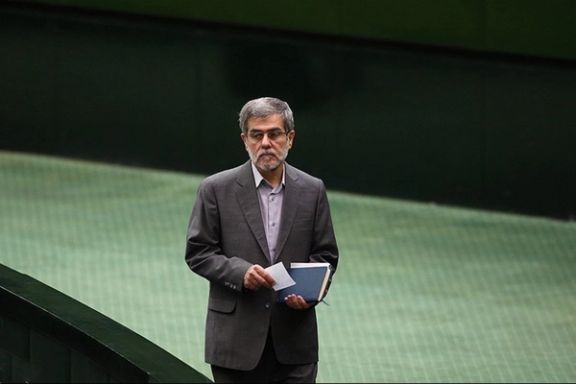
An ultra-conservative member of Iranian parliament has called for confidentiality of economic indicators and other statistics, under claims of security risk.
In a statement, Fereydoun Abbasi expressed support for withholding economic data, including statistical information about geographical data such as crop yields, information about dams and river water levels.
Abbasi, the former head of the Atomic Energy Organization of Iran and a member of the parliamentary energy commission, said, "Security and commercial data should not be made transparent, as enemies can exploit them to harm the country."
He claimed that revealing economic statistics could impact food security and open up vulnerabilities in economic warfare scenarios. He also said that disclosing geographical data, such as river water levels, dams, and electricity production could also be “detrimental to Iran's interests”.
His statements come following President Ebrahim Raisi decision to halt the publication of a substantial portion of economic statistics and indicators.
Internationally, indicators like inflation rates and foreign exchange reserves are generally considered non-confidential data, but Iran continues to call for non-disclosure, causing cause for suspicion from other nations.
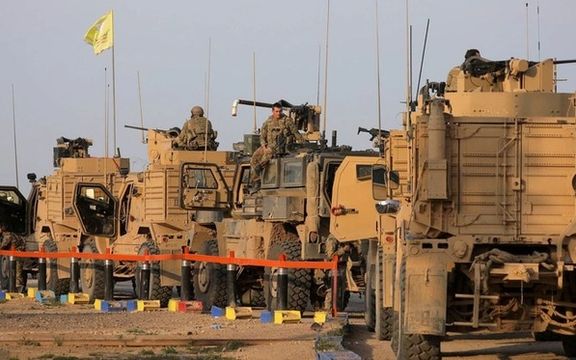
Amid reports of movements by US forces in Syria and Iraq, the American military as well as Iraqi officials have refuted reports of a military build-up.
Asharq Al-Awsat cited Major General Yahya Rasool, the spokesman for the Commander-in-Chief of Iraq’s Armed Forces, who stated on Sunday that there are no US military movements, despite footage of US military convoys circulating in separate Iraqi locations as shown in local media.
There are unconfirmed reports in local media that the US has deployed additional military forces along the border between Iraq and Syria, possibly preparing for an operation against pro-Iran militias in eastern Syria. The aim would be to disrupt Iranian supply routes to Syria and Lebanon.
Khalid al-Yaqobi, the Security Policy Advisor to the Prime Minister of Iraq, denied reports of the US army increasing its military presence in Iraq, according to the Iraqi News Agency. He claimed that the recent large-scale troop movements are merely “replacements” for the US-led forces in neighboring Syria. Yaqobi stated during a televised interview on Sunday, "There is no mobilization of US forces, but rather a replacement for US units present in Syria."
Three Iraqi officials, including a leader of an armed faction stationed in northwestern Iraq, informed the London-based newspaper that the US was repositioning its troops in the region, possibly preparing for a military operation outside Iraq. Another Iraqi government official told Asharq Al-Awsat that the alleged movements “are limited to locations outside the Iraqi border.”

An unnamed militia leader, likely from the groups backed by Iran, noted that the armed factions believe the strategic objective of the operation was to “change the rules of engagement with the Russians in Syria.” He emphasized that “What we have now is just speculation, based on limited information, as the Americans do not share much with Baghdad about their operations.”
According to the Iraqi figures, “the Americans will also try to cut off the Iranian supply route towards Syria and Lebanon, through Iraqi territory... This is all we know so far.”
Asharq Al-Awsat claimed that factions known for their opposition to the US presence are maintaining calm over the recent US movements, a departure from their usual behavior.
A senior official from the Coordination Framework, a coalition of Shiite parties aligned with Iran, was cited by Asharq Al-Awsat as saying, “The faction leaders recently discussed information about the American moves and received an Iranian message that what the Americans are doing, whatever it is, is not a cause for concern.” Earlier reports said the Shiite factions are “aware of an imminent operation and have been asked to avoid escalation.”
The US-led Coalition to combat the Islamic State (ISIS) also rejected reports of the United States deploying more troops to Iraq, stating it is part of a normal rotation of foreign forces in the country.
Major General Matthew McFarlane, the outgoing Commander of the Combined Joint Task Force-Operation Inherent Resolve (CJTF-OIR), was quoted by Kurdistan 24 as saying during a press conference on Sunday, “I have seen those rumors; they are just rumors. We are in the middle of rotations right now, which are normal routine activities involving bringing in new units with equipment.”
He added, “These rotations are necessary so our troops stay fresh and connected to their families. There was a press release in March from the Department of Defense about it, pending changes.”
Pentagon Press Secretary Air Force Brig. Gen. Pat Ryder stated on August 17 that claims of US forces being engaged in border security between Iraq and Syria are not true, emphasizing that they do not provide such security.
However, Foreign Policy Analyst Walid Phares suggested on Sunday that Iran’s Revolutionary Guards have temporarily suspended attacks on US units in Iraq because American and allied forces are coming close to shutting down most of the Syria-Iraq border.
Over the past few days, American troops have reportedly dispatched armored vehicles and soldiers to the Syrian border, entering from the Iraqi side and positioning near the city of al-Qa’im, adjacent to the border town of Al Bukamal along the Euphrates River. The US-led coalition has also conducted military exercises involving fighter aircraft at the "Koniko" base located in the northern outskirts of Deir ez-Zor, Iraq's Shafaq News Agency reported.
Moreover, the political wing of Iraq's Asa'ib Ahl al-Haq (AAH), an Iranian-backed Shiite militant group led by Qais al-Khazali, said that around 2,500 US soldiers have recently entered Iraqi territory and are now stationed at the Ain al-Assad Air Base.
This deployment coincides with the presence of military vehicles and combat aircraft in the area. Earlier in August, Washington announced that more than 3,000 US sailors and marines have arrived in the Middle East, along with the USS Bataan (LHD 50), an amphibious assault ship, and the USS Carter Hall (LSD 50), a dock landing ship.
The forces from the Bataan Amphibious Ready Group (ARG) and 26th Marine Expeditionary Unit (MEU) have been deployed in response to escalating tensions with Iran and as a show of maritime strength. In June, the Pentagon had already sent additional F-35 and F-16 fighter jets along with a warship to the Middle East to monitor key waterways in the region following Iran's seizure and harassment of commercial vessels. Recent developments in the region, including Iran's seizure and harassment of vessels, have seen tensions rising.
Earlier this week, Iran’s Revolutionary Guard released a video of surveilling and following a US Navy ship in waters off the coast of the Strait of Hormuz in the Persian Gulf. IRGC commanders, such as commander-in-chief Hossein Salami, keep threatening the US forces in the region.
Apparently, the new deal between Tehran and Washington only focuses on a prisoner swap and Tehran’s frozen funds without reducing tensions between the US forces and Iran’s proxy militias, led by IRGC's extraterritorial Quds force.

In a bid to reignite the faith of Iranians and to encourage them back to the mosques, the Minister of Culture has called for more mosque-based cultural activities.
Mohammad Mehdi Esmaili said that “the majority of cultural and artistic activities should take place in mosques.” He added that he has the support of Ebrahim Raisi's administration, which comprises many active mosque-going members, who are rallying around the slogan of "returning to mosques."
Esmaili’s remarks come as growing numbers of Iranians are becoming weary of the regime's justification of Islam as the base of its brutal dictatorship, reflected by months of violent protest since September in the wake of the death in morality policy custody of Mahsa Amini, arrested for the inappropriate use of her hijab.
In February, a senior Iranian cleric said 50,000 out of 75,000 mosques across the country had been closed due to a sharp decline in attendance.
Mohammad Abolghassem Doulabi, who serves as the intermediary between Ebrahim Raisi's administration and the country's seminaries, expressed concern over the reduced worship participation calling it a "worrying admission" for a state that has been constructed around the principles of Islam.
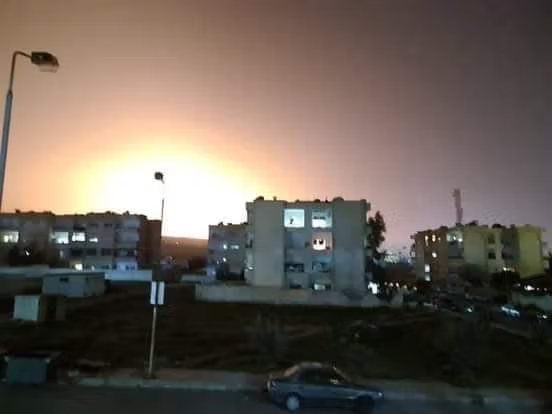
Israel late on Monday launched missiles at suspected Iranian and Hezbollah targets in the vicinity of Syria's capital Damascus.
The attack left one Syrian soldier injured and "caused some material damage," the Syrian state news agency SANA reported, citing a military source.
A London-based Syrian group (SOHR) monitoring the conflict in the war-stricken country reported that three areas were hit that contain warehouses and military positions of Lebanese Hezbollah and Iranian militias, but said no casualties were reported.
Two targets were in Al-Kaswa area that were also attacked on August 7.
SOHR says it has documented 23 attacks in 2023: 18 airstrikes and five rocket attacks by ground forces, during which Israel targeted several positions in Syria, destroying nearly 52 targets, including buildings, weapons and ammunitions warehouses, headquarters, centers and vehicles. These strikes killed 59 combatants and injured 61 others.
Israel has for years been carrying out attacks against what it has described as Iran-linked targets in Syria, where Tehran's influence has grown since it began supporting President Bashar al-Assad in the civil war that started in 2011.
Iran has spent tens of billions of dollars in Syria and deployed tens of thousands of Revolutionary Guards and militia forces consisting of Afghans, Iraqis, and Syrians. In addition, Iran’s strongest proxy force, the Lebanese Hezbollah has been the backbone of Tehran’s effort to keep Bashar al-Assad in power.
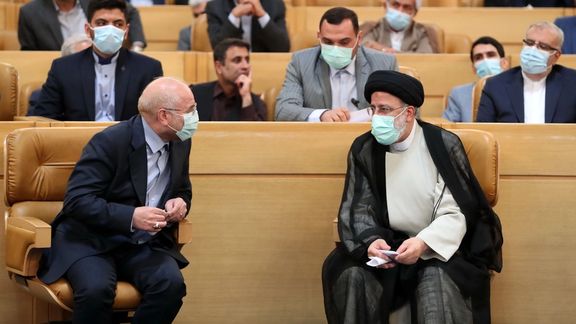
A conservative Iranian politician has alleged that those advocating "political purification,” aim to unseat Parliament (Majles) Speaker Mohammad Bagher Ghalibaf."
The term "purification" was coined by former Majles Speaker Ali Larijani to characterize ultraconservative allies of President Ebrahim Raisi, who wish to dominate the government by pushing out all other politicians and officials.
Mansoor Haqiqatpoor told Entekhab website on Saturday that "the refit between Speaker Ghalibaf and President Ebrahim Raisi has developed into a political faultline."
He said: "I do not think these conflicts are part of a political show. These are real conflicts. This is the continuation of the political purification initiative, and those who are behind it see Ghalibaf as an obstacle on the way to reaching their objectives and wish to get rid of him."
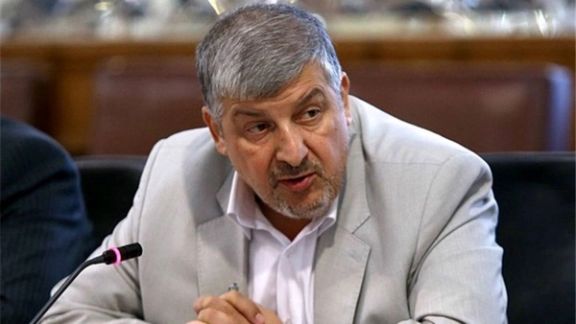
According to Entekhab, conflicts between Ghalibaf and Raisi have been intensifying recently as the ultraconservative Paydari Party, where the bulk of Raisi's supporters are, has been launching more serious attacks on Ghalibaf, blaming him for the government's problems.
Haqiqatpoor went on to say that Paydari's members had started challenging Ghalibaf's authority from the very beginning of the current Majles in 2020. He reiterated that after getting rid of former Speakers Larijani and Nateq Nouri and former President Hashemi Rafsanjani, the Paydari Party now seems to be adamant to omit Ghalibaf from the Iranian political scene.
He added that the ruling ultraconservatives are too arrogant to accept their responsibility in the government's economic, political and cultural failures and try to put the blame on Ghalibaf.
Haqiqatpoor said that Ghalibaf has now realized that the presence of reformists and moderates in the parliament would have been in his interest because they could have counterbalanced Paydari's pressure.
He said: "I hope those on top of the government, - presumably Khamenei and his aides - are intelligent enough to prevent handing over the government to a group that would push the Islamic Republic toward an abyss."
In the meantime, a similar purification process appears to be going on in the Iranian academic centers. A university professor, Ali Sharifi Zarchi wrote in a tweet on August 18 that "based on a document circulating in Iran's academic circles, the Raisi administration has secretly started the urgent process of hiring 15,000 faculty members without observing due scientific standards. This is a catastrophe, which, for instance, leads to hiring 100 non-experts for every medical school." Calling on the academics to protest against the action, Zarchi wrote: "The silence of the academic and scientific community [in the face of this action] will be a treason against Iran."
Meanwhile, Iranian journalist Maryam Shokrani has confirmed Zarchi's warning and further reported that "According to Farhikhtegan daily, following the dismissal of a large number of faculty members at the University of Tehran, Sharif University, Teachers Training University, and the University of Science and Technology and several medical schools have been demoted."
In another development, reformist journalist Mohammad Sadeq Javadi Hesar reminded the Raisi administration that what has kept the country backward is the absence of experts rather than the need for political purification. He added that getting rid of experts and highly qualified personnel has deprived the country of the growth and development it deserves.
He further said that the political purification is based on the old idea of insiders versus outsiders which has divided the country and alienated many for several decades now.
